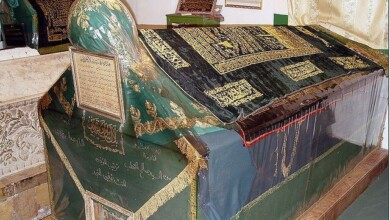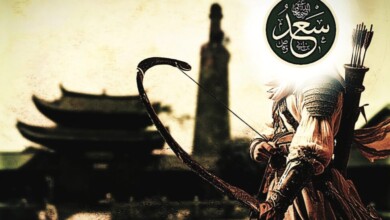Umayr Ibn Wahb: How an enemy furned friend
The first major battle between the newly established Muslim state and the unbelievers of the Quraysh was the Battle of Badr, which ended in a resounding victory for the Muslims. The unbelievers lost many of their leading figures and the most hardened opponents of Islam. One in seven of the Quraysh army of 1000 fighters was either killed or taken prisoner. As the Quraysh was the leading Arabian tribe, feared throughout Arabia, to suffer such a loss to an ill-equipped force which was no more than one-third of their numbers represented a very heavy blow. Hence, it was only natural that the Quraysh should reflect much on the defeat and try to find out whether it could take any steps to redress the situation, at least partially.
One Quraysh notable, Safwan, was extremely depressed by the fact that his father, Umayyah ibn Khalaf, and his brother, Ali, were both killed at Badr. Shortly after the battle he was talking to a friend of his called Umayr ibn Wahb about the defeat. Umayr was a man of courage and intelligence. Before the Prophet’s (peace be upon him) emigration to Madinah, Umayr used to cause the Prophet and his followers much harm. Although he escaped death and captivity in Badr, his son Wahb was taken prisoner. Safwan and Umayr sat next to the Kaabah and the topic of discussion was, inevitably, the Battle of Badr when Umayr said: “Had it not been for the fact that I am encumbered by debt which I cannot repay and that my children are so young that, if something should happen to me, they would suffer much hardship, I would have gone to Madinah pretending to pay my son’s ransom whom they hold as a prisoner, and I will make sure to kill Muhammad.”
Safwan realized that a great opportunity was opening up for him. He said to Umayr: “Do not worry about your debt; I will pay it all. Be reassured about your children; I will look after them for you. They will not be in need of anything I can provide.”
Umayr was indeed serious in his intention and did not make the proposition in order to hold back from implementing it. He promised his friend that he would depart as soon as possible and he made Safwan promise that he would not say a word about their agreement to anyone. Secrecy was extremely important for the success of their venture.
Umayr ordered that his sword should be sharpened for him and poisoned. He then set off secretly, not telling anyone of his purpose.
In Madinah, Umar ibn Al-Khattab was sitting with a group of Muslims, talking about their victory at Badr. They praised God for the great help He had given them, enabling them to overpower their enemies. Suddenly Umayr appeared. Umar was the first one to notice him as he dismounted at the doorstep of the Prophet’s mosque. He immediately noticed that Umayr had his sword with him. Umar said to his fellow Muslims: “This dog, Umayr ibn Wahb, is an enemy of God and he could only have come here for an evil purpose. He was the one to stir up trouble and to guess our number to our enemies on Badr day.”
Straight away Umar went to the Prophet and said: “Prophet, Umayr ibn Wahb, God’s enemy, has just arrived carrying his sword.” The Prophet asked Umar to let Umayr in. Umar went to him and took the belt on which he hung his sword, put it round his neck and let him through. He also said to the Ansar who were sitting with him: “Come in and sit with the Prophet. Be on your guard against this evil man; he is sly and cunning.” Then Umar let Umayr go in to see the Prophet.
When the Prophet saw Umar pulling Umayr with the belt of his sword around his neck, he told him to release Umayr and told Umayr to come nearer. To break the tension, Umayr greeted everybody with the greeting used by the unbelievers: “Happy be your morning.” The Prophet said to him: “God has blessed us with a greeting better than yours, Umayr. That is the greeting of peace, the greeting of the people in heaven.” Umayr replied, “By God, Muhammad, I have heard that only very recently.”
The Prophet then asked him about the reason for his journey to Madinah. Umayr used his pretext and said: “I have come for the prisoner you are holding. I would like to request you to be kind to him.”
The Prophet then asked him why he was carrying his sword on him. Umayr answered: “Confound these swords! They are indeed useless.” The Prophet repeated his question about the purpose of his journey and emphasized that he wanted to know the truth. Umayr again said that he simply came for his prisoner and there was nothing more to his being in Madinah at that moment.
“There is indeed,” the Prophet said, “a different purpose. You sat with Safwan ibn Umayyah at Al-Hijr and spoke about the losses of Quraysh in Badr, then you said to him: ‘Had it not been for my debts and my children, I would have gone to kill Muhammad.’ Safwan then said he would pay your debts and look after your children in return for your killing me. But God will see to it that your purpose is foiled.”
Astonished, Umayr said: “I declare that you are the Messenger of God. We used to say that you were lying when you spoke to us about faith and about the revelations you received. Now this is something that nobody witnessed except Safwan and myself. By God, I know that no one could have told you about it except Him. Praise be to Him that He has guided me to adopt Islam, and has shown me the right path. I declare that there is no deity but God, and that you are His Messenger.”
The Prophet turned to his companions and said: “Educate your brother in His faith and teach him the Qur’an, and release his prisoner for him.” These orders, naturally, were carried out.
It is interesting to note here that the Prophet referred to Umayr as the brother of his companions once Umayr had declared his acceptance of Islam. This declaration is, indeed, the only thing that is required of any person to join the brotherhood of the Muslims. Throughout the ages, this bond of brotherhood has been very real and very strong among the Muslims. It is a bond that supersedes all other ties and relationships. Once Umayr had made his declaration that he believed in God’s oneness and in the message of the Prophet, he became the brother of all Muslims who had been, until a moment earlier, his enemies.
Some days later Umayr came to the Prophet and said: “Messenger of God, I have worked very hard to put out God’s light, and caused much harm to those who were following God’s faith. I am now seeking your permission to go to Makkah and call its people to believe in God and His Messenger, and to accept Islam. I hope they will listen to me and that God will guide them aright. If they do not, I will inflict harm on them in the same way as I used to inflict harm on your people.” The Prophet granted him his request and Umayr set out on his return journey.
Back in Makkah, Safwan could not hide his excitement about Umayr’s mission. He said to some of his friends: “In a few days you will receive a piece of news which will make you forget the Battle of Badr.” If anyone arrived in Makkah coming from the direction of Madinah, Safwan went to him and asked him about Umayr. He soon learned that Umayr had adopted Islam. Safwan was greatly distressed and felt that he was badly let down. He made an oath that he would never speak a word to Umayr and would never do him a good turn.
When Umayr arrived in Makkah, he started to call its people to adopt Islam. Indeed, a number of people responded favorably and adopted Islam. The Battle of Badr had a tremendous effect on those who were in Makkah thinking about Islam and feeling a little reluctant to take the big step of adopting it. Many who kept the fact that they were Muslims secret were now more open about having followed the Prophet. Quite a number of people joined the ranks of the Muslims and went to Madinah.




